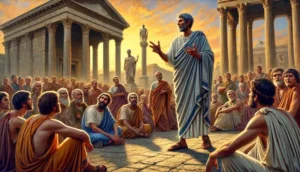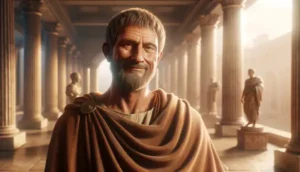In Letter 73, titled “On Philosophers and Kings”, Seneca addresses the misconception that philosophers are stubborn and rebellious, disdaining rulers and public officials. He argues that, on the contrary, philosophers hold rulers in high esteem because they provide the peace and leisure necessary for philosophical contemplation.
Seneca begins by refuting the belief that philosophers scorn rulers: “It seems to me erroneous to believe that those who have loyally dedicated themselves to philosophy are stubborn and rebellious, scorners of magistrates or kings or of those who control the administration of public affairs. For, on the contrary, no class of man is so popular with the philosopher as the ruler is; and rightly so, because rulers bestow upon no men a greater privilege than upon those who are allowed to enjoy peace and leisure.”
"No class of man is so popular with the philosopher as the ruler is; and rightly so, because rulers bestow upon no men a greater privilege than upon those who are allowed to enjoy peace and leisure."
Seneca Tweet This Quote
He explains that philosophers value the security provided by rulers, which allows them to focus on their higher pursuits: “Hence, those who are greatly profited, as regards their purpose of right living, by the security of the State, must needs cherish as a father the author of this good.” Seneca contrasts the philosopher’s gratitude with the ingratitude of the ambitious, who are never satisfied: “Besides, no man in public life thinks of the many whom he has outstripped; he thinks rather of those by whom he is outstripped. And these men find it less pleasing to see many behind them than annoying to see anyone ahead of them. That is the trouble with every sort of ambition; it does not look back. Nor is it ambition alone that is fickle, but also every sort of craving, because it always begins where it ought to end.”
He emphasizes the philosopher’s genuine gratitude towards rulers who enable their peaceful existence: “But that other man, upright and pure, who has left the senate and the bar and all affairs of state, that he may retire to nobler affairs, cherishes those who have made it possible for him to do this in security; he is the only person who returns spontaneous thanks to them, the only person who owes them a great debt without their knowledge.”
He explains that the philosopher values peace and liberty as shared goods that belong to all humanity: “The great and true goods are not divided in such a manner that each has but a slight interest; they belong in their entirety to each individual… These goods, however, are indivisible, – I mean peace and liberty, – and they belong in their entirety to all men just as much as they belong to each individual.”
These goods, however, are indivisible, – I mean peace and liberty, – and they belong in their entirety to all men just as much as they belong to each individual.
Seneca Tweet This Quote
Seneca underscores the philosopher’s recognition of their debt to rulers: “Our philosopher will therefore acknowledge that he owes a large debt to the ruler who makes it possible, by his management and foresight, for him to enjoy rich leisure, control of his own time, and a tranquillity uninterrupted by public employments.” He extols the value of philosophical leisure, which allows one to spend time among the gods and become godlike: “Yes, this is what I mean, Lucilius; and I invite you to heaven by a short cut… Do you marvel that man goes to the gods? God comes to men; nay, he comes nearer, – he comes into men.”
Seneca concludes by stressing the divine nature within humans, which, if cultivated properly, can grow and flourish: “Divine seeds are scattered throughout our mortal bodies; if a good husbandman receives them, they spring up in the likeness of their source and of a parity with those from which they came. If, however, the husbandman be bad, like a barren or marshy soil, he kills the seeds, and causes tares to grow up instead of wheat.”
This letter serves as a reminder of the philosopher’s deep appreciation for the peace and stability provided by rulers, which allows for the pursuit of wisdom and the cultivation of the divine within.
***** Letters from a Stoic Key Takeaways is a collection of short key takeaways from the letters sent by Seneca to Lucilius. Read each letter’s key takeways here .






